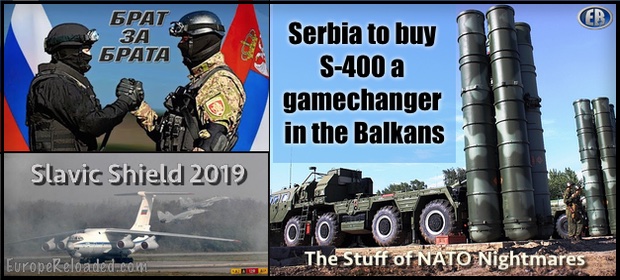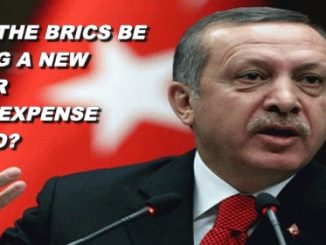
ER Editor: We recommend this short piece with video accompaniment from the Moscow Times titled Russia, Serbia Follow ‘Slavic Shield’ With Second Joint Military Drill.
Linked to below, we also recommend independently this piece by Paul Antonopoulous for InfoBrics on the little known Greater Albania project titled Is the ‘Greater Albania’ Project Aimed Against Russia in the Balkans?
********
Why Are Bulgarian Atlanticist’s Opposing the Russian S-400 in Serbia?
PAUL ANTONOPOULOS
The arrival of the Russian S-400 and Pantsir S missile defense systems in Serbia for the “Slavic Shield 2019” military exercises demonstrated not only the fraternal relationship between Belgrade and Moscow, but also that Russia has an interest in helping Serbia improve its air defense, while opening up the possibility for the Balkan country to procure these systems. This, of course, has been criticized by Serbia’s neighbors, all of whom are NATO members or have aspirations to become NATO members.
The significance of such systems leaving Russia’s borders for military exercises, especially in the volatile Balkans, cannot be downplayed. Rather, the movement of such systems is a symbolic message to the war hawks in the United States and Western European powers that the Balkans is not yet firmly in the control of NATO, and that Serbia has not yet bowed to significant pressure to recognize Kosovo (see map) as an independent country.

If the Serbian state finds funds and acquires any of the systems that appeared in the Slavic Shield 2019 exercises, familiarizing officers and soldiers with these systems will allow it to be implemented more quickly when finally purchased, allowing for the balance of power in the Balkans to significantly change. It would have been expected that the biggest criticisms of the potential Serbian purchase of the S-400 system would come from traditional rivals, Albania and Croatia. Surprisingly this was not the case, with the greatest criticisms coming from fellow Christian Orthodox and Slavic-speaking country, Bulgaria.
Former Bulgarian ambassador to the U.S., Atlantic Club of Bulgaria board member Elena Poptodorova, claimed that Serbia’s third largest city Niš was apparently a Russian spy base, without providing evidence of course, and that the S-400 system covers the entirety of Bulgaria and the Western Balkans.
Poptodorova’s claim also comes as former Bulgarian Foreign Minister Solomon Passy commented from his Twitter profile on a photo of Serbian President Aleksandar Vučić with European Commission President Jean-Claude Juncker and European Commissioner Johannes Hahn, urging the European Commission to pay attention to Russian activity in Serbia.
“Will there be any discussion about the Russian military presence in Serbia and the Russian spy center in Niš? Or do we and the KGB offer European perspectives?” Passy questioned on Twitter.
Earlier, the Atlantic Club of Bulgaria, also chaired by Passy, said they were concerned about transporting Russia’s S-400 systems to Serbia, as the presence of such systems in the heart of the Balkans would form a zone that NATO would find difficult to penetrate in the event of a crisis. This is because the S-400 covers the airspace of western Bulgaria, including the capital of Sofia.
Although these statements are coming from former officials, the influence they wield over the political landscape in Bulgaria with NATO and the U.S. backing the Atlantic Club of Bulgaria, cannot be overstated. Although it is unlikely to create major hostilities between Serbia and Bulgaria, it has the potential to trigger another flashpoint between Russia and the U.S., just as has happened recently between Greece and Turkey in the Eastern Mediterranean.
With Serbian territory threatened by a project for Greater Albania because the country remains the only pro-Russia state in the Balkans, Serbia acquiring the S-400 will be a game changing piece of equipment that can alter the balance of power in the Balkans to not be NATO-dominated. In addition, with the success of the Slavic Shield 2019 military exercises, it is likely that similar military exercises between Serbia and Russia will become routine, bringing more Russian troops into the Balkans.
If Serbia responds positively to Russia’s desire to install an air defense base on its territory, an obstruction zone of 400 km of airspace will be created, and this will be a problem not only for Bulgaria, but for all of NATO as well. This prospect of Serbia acquiring the S-400 system comes at a time when Bulgaria, Romania and Croatia have programs to modernize their air forces with U.S.-made F-16 fighter aircrafts. However, programs of modernizing fighter aircraft will be rendered nearly useless if the Russian air defense systems arrive permanently in Serbia, especially as all other neighboring states do not have sophisticated air defense systems like the S-400.
If Russia does indeed reach an agreement with Serbia, then the issue becomes very complex. With Turkey slowly moving away from NATO and strengthening its relations with Moscow, NATO’s positioning and strength in the Black Sea is becoming increasingly weaker. The simple fact remains that in a hypothetical war between Russia and NATO, a priority would be to block the Russian Black Sea fleet. Only Turkey and Greece have the potential capability to block Russia in the Black Sea. Bulgaria and Romania are also Black Sea NATO members, and Georgia and Ukraine are also recognized as potential NATO members. It appears at first that this combined strength could be enough to contain Russia in the Black Sea, but their combined navies actually do not have the strength to challenge Russia in the Black Sea without the participation of Turkey.
Therefore, it is in the interest of Serbia to acquire the S-400 as it can alleviate pressure the country faces over the Kosovo issue and Belgrade’s insistence on maintaining strong ties with Russia. For Russia, the S-400 placement in Serbia serves as a means to further pressure Bulgaria and Romania if they become aggressive towards the Eurasian Giant, and against the vast NATO presence in Kosovo, Bosnia and Herzegovina, and elsewhere in the Balkans. For both Serbia and Russia, the S-400 in the heart of the Balkans changes the balance of power, especially as Bulgaria has always been a traditional military land power in the region.
Although Bulgaria owes its independence from the Ottoman Empire to the series of Russo-Turkish wars in the 1800’s, Sofia has undeniably become an active part of establishing U.S. hegemony over the Balkans. The ruling Bulgarian government are yet to comment on the potential Serbian purchase of the S-400. However, with powerful U.S. and NATO supported think tanks in Bulgaria pushing the country to oppose the Russian missile defense systems in Serbia, it is likely that Sofia will adopt an adversarial policy against Belgrade if the S-400 is delivered.
How NATO will respond to the S-400 in Serbia remains to be seen. But it is likely to force a rethink of the organization’s Black Sea and Balkan strategies. Where once it seemed that NATO comfortably ruled over the Balkans and the Black Sea after the destruction of Yugoslavia and dissolution of the Soviet Union in the 1990’s, a time when Russian President Boris Yeltsin allowed the Russian military and economy to deteriorate into obscurity, Russian President Vladimir Putin has strategically reaffirmed Russian influence into these regions, whether the S-400 is sold to Serbia or not.
Original article

••••
The Liberty Beacon Project is now expanding at a near exponential rate, and for this we are grateful and excited! But we must also be practical. For 7 years we have not asked for any donations, and have built this project with our own funds as we grew. We are now experiencing ever increasing growing pains due to the large number of websites and projects we represent. So we have just installed donation buttons on our websites and ask that you consider this when you visit them. Nothing is too small. We thank you for all your support and your considerations … (TLB)
••••
Comment Policy: As a privately owned web site, we reserve the right to remove comments that contain spam, advertising, vulgarity, threats of violence, racism, or personal/abusive attacks on other users. This also applies to trolling, the use of more than one alias, or just intentional mischief. Enforcement of this policy is at the discretion of this websites administrators. Repeat offenders may be blocked or permanently banned without prior warning.
••••
Disclaimer: TLB websites contain copyrighted material the use of which has not always been specifically authorized by the copyright owner. We are making such material available to our readers under the provisions of “fair use” in an effort to advance a better understanding of political, health, economic and social issues. The material on this site is distributed without profit to those who have expressed a prior interest in receiving it for research and educational purposes. If you wish to use copyrighted material for purposes other than “fair use” you must request permission from the copyright owner.
••••
Disclaimer: The information and opinions shared are for informational purposes only including, but not limited to, text, graphics, images and other material are not intended as medical advice or instruction. Nothing mentioned is intended to be a substitute for professional medical advice, diagnosis or treatment.




